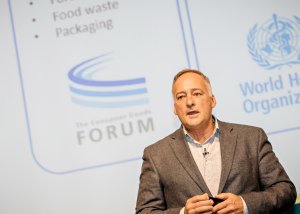Think for just a moment about the challenges facing global agriculture and our food system over the coming decades, and you’ll realize—we have a lot of work to do.
The UN’s Food and Agriculture Organization puts it like this: “(global agriculture) has to produce more food and fibre to feed a growing population, with a smaller rural labour force… contribute to overall development in the many agriculture-dependent developing countries, adopt more efficient and sustainable production methods and adapt to climate change.”1
It’s a big vision, and a demanding one. The world population is going to grow by an estimated 2.3 billion people between 2009 and 2050, and our planet will need more food than ever before.2 This is not just an economic challenge. It’s a moral challenge, and we all must play a part in solving it.
According to United Nations, forced labour is a hugely pressing humanitarian issue with millions of people trapped or exploited in situations of modern slavery.3 Through the egg industry’s engagement with The Consumer Goods Forum, I was astonished to learn that there are more people in forced labour now, than at any other time in our history. This information is unsettling and it’s up to us to step up and face this issue head on.

To demonstrate our commitment, the Board of the World Egg Organisation adopted The Consumer Goods Forum’s resolution on Forced Labour at our international industry conference in April. This commitment makes us the first global commodity group to take these steps as part of our wider efforts to promote human rights and decent working conditions worldwide.
World Egg Organisation Resolution on Forced Labour
As the Board of the World Egg Organisation, we recognise our role as responsible businesses to respect and promote human rights and decent working conditions worldwide, in alignment with ongoing efforts such as the United Nations Guiding Principles on Business and Human Rights and other international frameworks including the ILO Declaration on Fundamental Principles and Rights at Work, the OECD Guidelines for Multinational Enterprises and the recently launched United Nations Sustainable Development Goals.
As part of our wider efforts to promote human rights and decent working conditions worldwide, we acknowledge the broad societal problems of modern slavery and we strive to eradicate forced labour from our value chains. We will also continue not to tolerate forced labour within our own operations.
To do so, we will harness the power of collective action as an industry group to identify and address issues and geographies of shared concern, enhancing the efficiency of any individual company initiatives in this area.
In areas of shared concern, we will jointly develop specific action plans supporting the eradication of forced labour, in alignment with the widely embraced guidance provided by the United Nations Guiding Principles on Business and Human Rights.To achieve this ambitious goal, we will work closely with other industries, with governments and with civil society.
Our efforts in this area are rooted in a robust vision of sustainability for global egg industry. Through our Global Initiative for Sustainable Eggs, a multi-stakeholder initiative that drives collaboration in the areas of egg production that is environmentally sound, socially responsible, and economically viable, our members have identified a range of ambitious sustainability objectives that guide our actions and establish a foundation to assess progress over time.
As we look ahead, the numbers are clear and the challenge is looming, but we achieve impressive results when we work together to achieve progress in this area.
Sources:
1 Food and Agriculture Organization
2 Food and Agriculture Organization
3 International Labour Organization
This post was written and contributed by:
Tim Lambert
Chairman, World Egg Organisation
@TimLambertEFC

